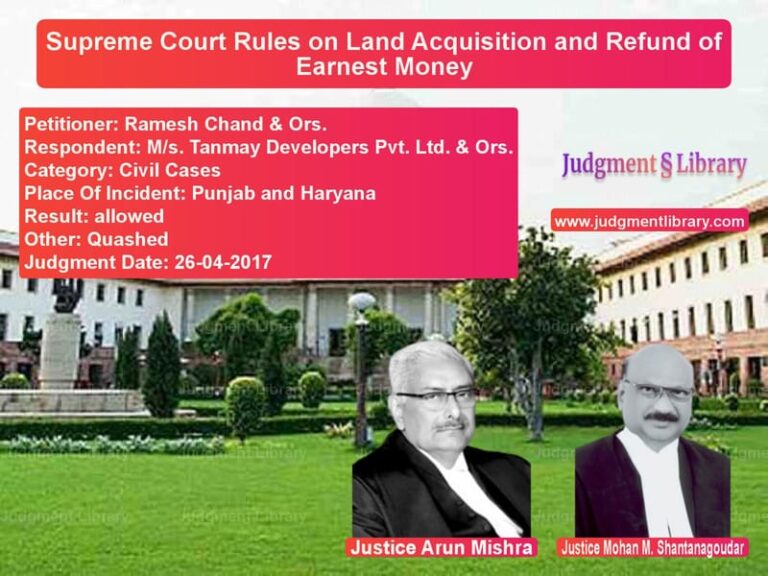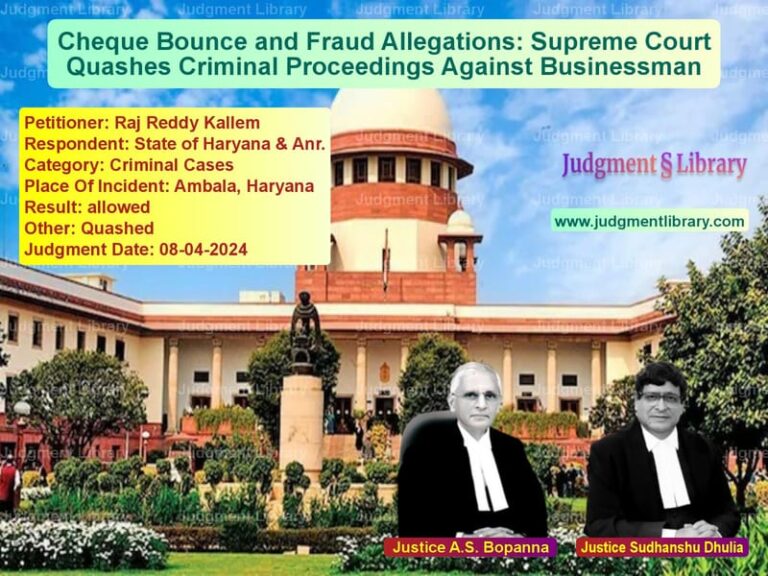Madhya Pradesh Land Dispute: Supreme Court Dismisses State’s Appeal Over 5-Year Delay
The Supreme Court of India has dismissed a Special Leave Petition filed by the State of Madhya Pradesh against a High Court ruling that denied the state’s claim over disputed government land. The case, State of Madhya Pradesh vs. Ramkumar Choudhary, was dismissed due to an inordinate delay of 5 years, 10 months, and 16 days in filing the appeal. The Court imposed a fine of Rs. 1,00,000 on the State for failing to justify the delay, sending a strong message about the importance of timely litigation.
Background of the Case
The dispute revolves around 1,300 hectares of government land in Majhganwa village, Katni district, Madhya Pradesh. The respondent, Ramkumar Choudhary, had sought a declaration of ownership and a permanent injunction, claiming possession of portions of this land since 1970.
Key Events
- 2011: The respondent filed a civil suit claiming ownership of government land.
- 2013: The Trial Court ruled against the respondent, dismissing his suit.
- 2014: The respondent appealed to the Additional District Judge, who ruled in his favor, overturning the trial court’s decision.
- 2019: The State of Madhya Pradesh filed a Second Appeal after a delay of 1,788 days.
- 2024: The High Court rejected the appeal due to the excessive delay, leading the State to file the present Special Leave Petition in the Supreme Court.
Arguments Presented
State of Madhya Pradesh’s Arguments
The government’s legal counsel argued:
- The land in question is government property and cannot be claimed by private individuals.
- The High Court should have considered the merits of the case rather than dismissing it solely on procedural grounds.
- The delay was caused due to administrative processing and was not intentional.
- The government took necessary steps to escalate the matter but faced bureaucratic hurdles.
Respondent’s Arguments
Ramkumar Choudhary’s legal team contended:
- The government failed to justify the delay adequately.
- The case had already been litigated at multiple levels, and the government had ample time to act.
- Allowing such delayed appeals would set a dangerous precedent, causing unnecessary litigation.
- The High Court had rightly applied the law by dismissing the appeal on procedural grounds.
Supreme Court’s Observations
The Supreme Court carefully examined the facts and legal precedents related to condonation of delay. The Court emphasized:
1. Unjustified Administrative Delay
- The government took over a year just to forward the lower court’s judgment to the relevant authorities.
- It then took another three years to obtain permission from the Law Department to file an appeal.
- Such inefficiency demonstrated negligence rather than a genuine obstacle.
2. No Special Treatment for Government Entities
- The Court reaffirmed that the government cannot be given special privileges regarding delays in litigation.
- All litigants, private or governmental, must adhere to the principles of timeliness.
3. Condemnation of Bureaucratic Lapses
- The Court criticized the casual approach of government officials in handling legal matters.
- It directed that steps be taken to fix accountability and prevent future delays in legal proceedings.
Supreme Court’s Final Ruling
The Supreme Court delivered a firm judgment:
“We are inclined to reject this petition at the threshold. The government’s failure to act in a timely manner has resulted in an inordinate delay that cannot be justified.”
The Court further ruled:
- The appeal was dismissed with costs of Rs. 1,00,000 to be deposited within two weeks.
- The amount was directed to be paid to the Supreme Court Mediation Centre.
- If the government failed to pay, the Supreme Court Registry was authorized to initiate recovery proceedings.
Impact of the Judgment
1. Strengthening Timeliness in Litigation
The ruling underscores that appeals must be filed within statutory timelines. Excessive delay without valid justification will not be entertained.
2. Holding Government Officials Accountable
The Court called for systemic reforms to prevent delays caused by inefficiency and bureaucratic inaction.
3. Protecting Private Litigants from State Misuse of Legal System
The judgment sets a precedent against government entities attempting to revive old cases after prolonged delays.
Conclusion
The Supreme Court’s decision in State of Madhya Pradesh vs. Ramkumar Choudhary is a landmark ruling emphasizing the importance of procedural discipline in litigation. By dismissing the appeal and imposing costs, the Court has reaffirmed the principle that justice delayed is justice denied. This case serves as a strong reminder that even government entities must act within prescribed time limits or face legal consequences.
Petitioner Name: State of Madhya Pradesh.Respondent Name: Ramkumar Choudhary.Judgment By: Justice J.B. Pardiwala, Justice R. Mahadevan.Place Of Incident: Majhganwa, Katni, Madhya Pradesh.Judgment Date: 28-11-2024.
Don’t miss out on the full details! Download the complete judgment in PDF format below and gain valuable insights instantly!
Download Judgment: state-of-madhya-prad-vs-ramkumar-choudhary-supreme-court-of-india-judgment-dated-28-11-2024.pdf
Directly Download Judgment: Directly download this Judgment
See all petitions in Property Disputes
See all petitions in Damages and Compensation
See all petitions in Landlord-Tenant Disputes
See all petitions in Judgment by J.B. Pardiwala
See all petitions in Judgment by R. Mahadevan
See all petitions in dismissed
See all petitions in supreme court of India judgments November 2024
See all petitions in 2024 judgments
See all posts in Civil Cases Category
See all allowed petitions in Civil Cases Category
See all Dismissed petitions in Civil Cases Category
See all partially allowed petitions in Civil Cases Category







